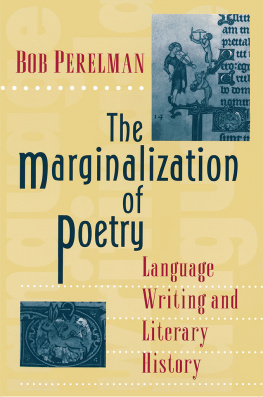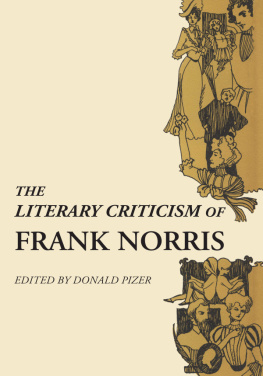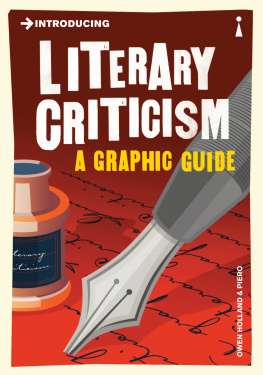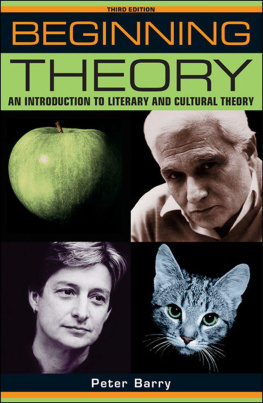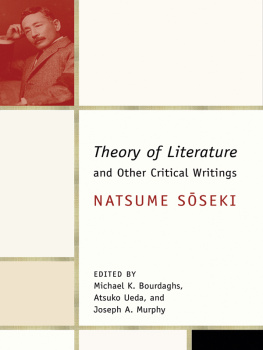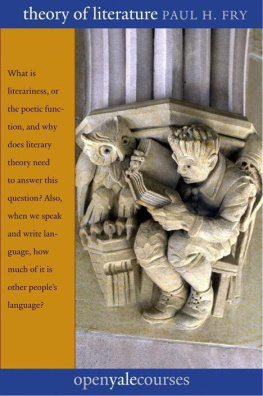Biographical Note
In 1986, Frank Lentricchia told an interviewer, Im not a gentleman scholar. This was not posturing: Lentricchia was born to working-class parents in Utica, New York, on May 23rd in 1940. Frank John and Ann Iacovella Lentricchia, children of immigrants from Southern Italy, both left school after the eighth grade to begin work. Young Frank attended the local public schools. His earliest enthusiasms were reading and baseball. He was graduated from Utica College in 1962, where his love of literature was further stimulated by inspiring professors, who encouraged him to attend graduate school. He earned his M.A. from Duke University in 1963, and his Ph.D. in 1966. At Duke he came under the influence of Bernard Duffey, a scholar of modern poetry, which would become Lentricchias main area of interest as well.
In 1967, Lentricchia married Karen Young, with whom he had two daughters, Rachel and Amy. He also began his teaching career at UCLA, soon followed by a stint at UC, Irvine, where he was eventually promoted to full professor. His first two books were about modern poetry, and he then began to write more about literary theory, publishing his ground-breaking books in the early 1980s. His first marriage ended in divorce and, in 1973, he married Melissa Christensen, with whom he edited a book on Robert Frost. After a teaching post at Rice University, Lentricchia returned to his graduate school alma mater in 1984 as a Professor of English, and was instrumental in recruiting an all-star faculty to the school, turning this department of traditional literary studies into a hotbed of literary theory and criticism. Lentricchias left-wing politics caught the attention of a number of journalists and neo-conservative polemicists, who sought to document the rise of campus radicalism at the time.
Throughout this period, Lentricchia was invited to lecture at major universities across the country, and served as the editor of two book series, one for The University of Chicago Press (The Wellek Library Lectures), and one for the University of Wisconsin Press (The Wisconsin Project on American Writing). He was also editor of The South Atlantic Quarterly from 1984 through 1991, when he became a chaired professor at Duke. During these years, his second marriage failed, and he began to drift from his previous work in theory. In 1994, after spending time at other non-academic pursuits, Lentricchia married Jody McAuliffe, a drama professor at Duke who also directs and writes. They have a daughter, Maeve, who was born in 1994. Lentricchias first non-scholarly book, The Edge of Night, was published in 1994, and he soon followed with his much-noted essay in Lingua Franca, Last Will and Testament of an Ex-Literary Critic, his farewell to certain types of academic criticism and theory. Though he did not completely abandon literary comment, Lentricchia from then on devoted himself to fiction. He continues to write and teach in Durham, North Carolina.
Being Frank
PHILIP TINARI
Adorning the walls of his East Campus office are three paintings from the Duke art museums permanent collection. One, a somber, disfigured nude in dark hues, was painted bya Duke art student in the late Sixties, shortly before his suicide. This is the favorite, the one he asked for; the other two were there already when he moved in 1993 from his earlier perch in the Allen Building. The room is adorned in mahogany, with a large desk, two walls of bookshelves, and a small, round table with chairs that barely reveal their institutional heritage. There is no computer, not evena typewriter just yellow legal pads and a can of pencils. The office corner frames a poster advertising Ezra Pounds 1931 pamphlet How to Read, with those three contentious words emblazoned on yellowing leaves in 40-point type. This is the office of Thomas Lucchesi, professor of American literature, writer of letters, visitor of moribund friends. A man who teaches college only because [his] fiction is commercially untouchable, and who works tirelessly, if not productivity, on some experimentalnovel. A man who can deal more aptly with art than with life. A man whose passion to createcan, time and again, isolate him and saddle him with anxiety. A self-fashioned mad Ahab of reading, who searches desperately, in heartfelt scholarly prose, for the meaning within Melvilles Moby-Dick. A man who sometimes sees his world through the prism of Ludwig Wittgensteins Philosophical Investigations. But above all, a man whose love for life, for his intimates, and himself, endures.
In reality, it is the office of Frank Lentricchia A.M. 1963, Ph.D. 1966, Katherine Everett Gilbert Professor of literature, celebrated critic, novelist, master teacher, lover of high modernist poetry, and creator of Thomas Lucchesi. His work, especially a critical trilogy in the 1980s, has inspired many a fierce devotee of its own. In an angry testimonial published in 1996 he famously disavowed his status as a pre-eminent literary critic and the entire notion of politically based, politically biased, politically correct scholarship, which he has been charged with inventing. Finally, he has turned to close reading and fiction writing as outlets for the literary passion he refused to let the academy contain. Lucchesi is the hero of Lentricchias Lucchesi and The Whale (the The, in reference to Melvilles creation, takes its capital on purpose), published last year by Duke University Press. And for its author, Lucchesi is an outgrowth of a preoccupation with the cost of shutting yourself down in order to practice total devotion to your work.
Lucchesi began with a few literary sketches culled from the authors dreams, and grew from there into a lyric fiction. Through it all, the awake Lentricchia was dealing with the baggage of a semester of Melvilles Moby-Dick, during which the book suddenly loomed before me as unteachable. Channeling frustration into inspiration, he says he began to think this obsession with Melville would give some coherence to the various fragments of narrative that I had just put together. Inevitably, I came to the point where I realized that my character had to confront Moby-Dick, and that became the central drama of the book. He describes it finally as the kind of narrative that sits on the border between realism and fantasy. An opera in four acts, the book opens with two sequences of dreams culled from the authors nightly travels, everything from a family of cannibalistic snakes to an evening at La Scala, where Lucchesi-the-writer is called to replace Pavarotti-the-singer. A comic interlude titled Writer in Residence separates these earlier forays from the following meat of the book, which is a critical reflection in the form of an obessive monologue on Melvilles Moby-Dick. In a few hundred words, Lucchesi is dismissed from his post at Central College at the behest of the dean and a certain President Jan who find his pedagogy, which consists of repeated and strenuous exercise in deep aesthetic immersion, risible. Chasing Melville, an animated spell of light-hearted criticism in Lucchesis thinly disguised Lentricchian voice, takes up the central question of hyphenation.


